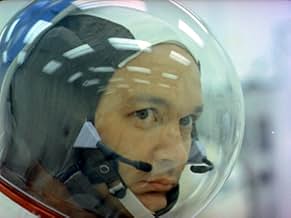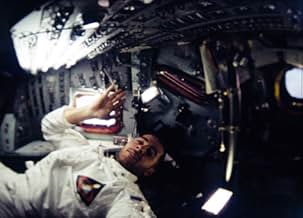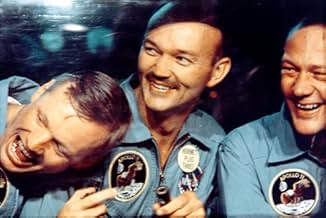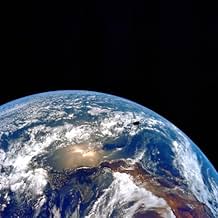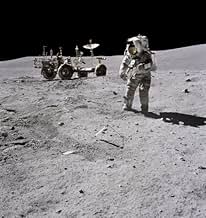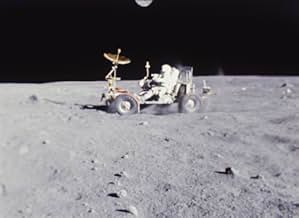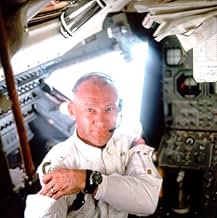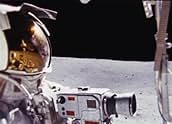Ajouter une intrigue dans votre langueThe crew members of NASA's Apollo missions tell their story in their own words.The crew members of NASA's Apollo missions tell their story in their own words.The crew members of NASA's Apollo missions tell their story in their own words.
- Prix
- 6 victoires et 13 nominations au total
Jim Lovell
- Self
- (as James Lovell)
Edgar D. Mitchell
- Self
- (as Edgar Mitchell)
Dave Scott
- Self
- (as David Scott)
William Anders
- Self
- (archive footage)
Neil Armstrong
- Self
- (archive footage)
Stephen Armstrong
- Self
- (archive footage)
Viola Armstrong
- Self
- (archive footage)
Jules Bergman
- Self
- (archive footage)
Frank Borman
- Self
- (archive footage)
Roger B. Chaffee
- Self
- (archive footage)
Yuri Gagarin
- Self
- (archive footage)
Histoire
Le saviez-vous
- AnecdotesOf all the astronauts who appeared in the film, only Buzz Aldrin demanded to be paid.
- GaffesThe 1202 alarm was not a programming error in the Apollo Guidance Computer, but rather a hardware design bug, already documented by Apollo 5 engineers. Since the 1202 alarm had occurred only once during testing, NASA decided to go with the radar hardware with known problems instead of using untested newer alternatives with unknown problems.
- Citations
Charlie Duke: My father was born shortly after the Wright Brothers. He could barely believe that I went to the Moon. But my son, Tom, was five. And he didn't think it was any big deal.
- ConnexionsAlternate-language version of Universum: Im Schatten des Mondes (2009)
Commentaire en vedette
Saw this film at Sundance, the screening reserved for the Grand Jury World Documentary Award Winner. Wow! I have seen many of the preceding documentaries on the history of the American space program, the Apollo program in particular. Where this documentary exceeds all previous efforts was in revealing the humanity of the astronauts. Most other documentaries focus on the politics which motivated and technical hurdles overcome in the American space program. David Sington brilliantly uses only the astronauts voices for narration of facts and more with newly released footage from NASA, as well as a lot of footage we've all seen before. Because of the free rein given to the astronauts in the interviews, you see many sides of each revealed. For instance, Mike Collins (who has heretofore rarely been interviewed) reveals wonderful humor and joy in his accomplishments. You find out more about their worries and fears, how they look back on their work and what they were thinking at the time. They are all revealed as nice guys with whom you would want to spend an afternoon.
Strangely absent, but it works well in the end, was Armstrong. He gives virtually no interviews. In a way, having everyone else talk about him is maybe better than him talking.
And, the various conspiracy theories are dealt with in the end credits. This is a great place to do it. In films we sometimes see the end credits used for humorous out-takes, epilogue commentary, and so forth. By dealing with the conspiracy theories in an appended manner during the credits, the film refuses to elevate them to the level of legitimacy that the remainder of the facts and biographical material, yet still dismisses them. The single best dismissal is this: If it was all faked, why did they fake it so many times? Wouldn't once have been enough?
See this film when it comes to your neighborhood theater, as it has been announced as having a distribution deal. It is worth seeing on the big screen for its amazing visuals.
Strangely absent, but it works well in the end, was Armstrong. He gives virtually no interviews. In a way, having everyone else talk about him is maybe better than him talking.
And, the various conspiracy theories are dealt with in the end credits. This is a great place to do it. In films we sometimes see the end credits used for humorous out-takes, epilogue commentary, and so forth. By dealing with the conspiracy theories in an appended manner during the credits, the film refuses to elevate them to the level of legitimacy that the remainder of the facts and biographical material, yet still dismisses them. The single best dismissal is this: If it was all faked, why did they fake it so many times? Wouldn't once have been enough?
See this film when it comes to your neighborhood theater, as it has been announced as having a distribution deal. It is worth seeing on the big screen for its amazing visuals.
- pbernhardt
- 27 janv. 2007
- Lien permanent
Meilleurs choix
Connectez-vous pour évaluer et surveiller les recommandations personnalisées
Détails
- Date de sortie
- Pays d’origine
- Sites officiels
- Langues
- Aussi connu sous le nom de
- У тіні Місяця
- sociétés de production
- Consultez plus de crédits d'entreprise sur IMDbPro
Box-office
- Budget
- 2 000 000 $ US (estimation)
- Brut – États-Unis et Canada
- 1 134 358 $ US
- Fin de semaine d'ouverture – États-Unis et Canada
- 38 281 $ US
- 9 sept. 2007
- Brut – à l'échelle mondiale
- 2 161 369 $ US
- Durée1 heure 40 minutes
- Couleur
- Mixage
- Rapport de forme
- 1.85 : 1
Contribuer à cette page
Suggérer une modification ou ajouter du contenu manquant

Lacune principale
By what name was In the Shadow of the Moon (2007) officially released in India in English?
Répondre





